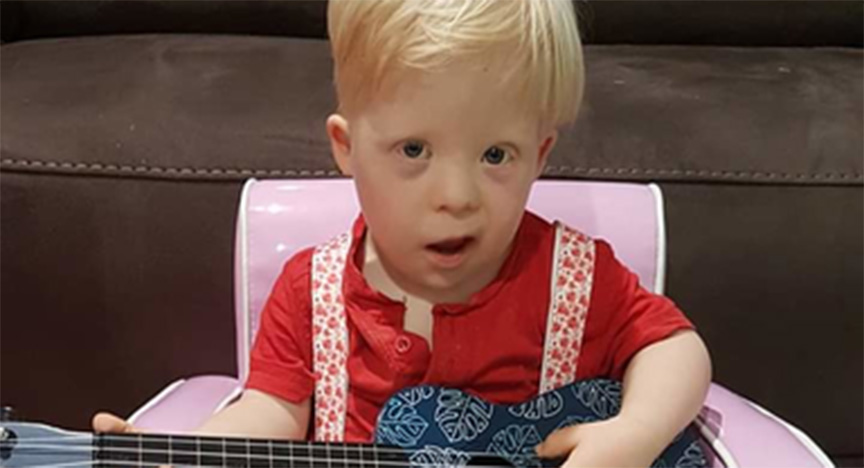
George is your typical mischievous, dinosaur-loving three-year-old, who considers himself to be the fifth wiggle.
A nuchal translucency scan – which tests for chromosomal abnormalities – early on in his mother, Cassandra’s, pregnancy, identified that further testing was needed as George may have Down syndrome. This was later confirmed with non-invasive prenatal testing (NIPT), an amniocentesis, and genetic testing after he was born.
Due to complications with the pregnancy – including doctors suspecting George had no connection between his oesophagus and his stomach, as well as extra fluid build-up in his brain – George was born 7-weeks premature at just 1.17kg, and spent 56 days in the Neonatal Intensive Care Unit (NICU). It was after his birth that doctors confirmed he had hydrocephalus, patent foramen ovale (PFO), and chronic neonatal lung disease, which meant George needed extra oxygen.
By his third birthday, George from Jimboomba, had undergone several operations, including an adenotonsillectomy – an operation to remove the tonsils and adenoids – another procedure to help tighten George’s floppy larynx, as well as eye surgery to correct strabismus (crossed eyes), and endoscopic third ventriculostomy (ETV) to drain the excess fluid in his brain.
“Since these operations, he has come in leaps and bounds! I’m so thankful that all the initial issues were dealt with so quickly, and that George could get on with being a normal child,” Cassandra said.
“George is getting stronger every day, but he still has quite a sensitive immune system. He also requires hearing aids and may need glasses in the future due to his Astigmatism in both eyes. Any other health problems haven’t emerged yet – but we will deal with them as they do.”
George still undergoes regular sleep studies and consultations with the respiratory team at QCH, as well as getting regular checks with specialist teams including ophthalmology, audiology and neurology.
“George has been so strong through his operations, check-ups and hospital admissions. Obviously, he doesn’t want to be best friends with anyone who turns up in scrubs or with a stethoscope, but he is easily persuaded, especially by the Starlight Captains!” she said.
“Having a child with Down syndrome is nothing like I had imagined it would be. I am surrounded by an amazing tribe of people, and we have met many other children and adults with Down syndrome. The adults we have met include a model, an actress, and a public speaker who’s worked with the UN. These people have taught me that George will only be restricted by others, not himself.”
“The fear of the unknown can make people afraid of doing certain things – but George has taught me that the outcome usually far outweighs all the worrying you do beforehand.”
Despite his rocky start to life, George is a happy go lucky kid with a lust for life – and like many other three-year-old’s, he “thinks he is the fifth Wiggle”, and loves animals, music and books.
So what advice does Cassandra have for other parents whose child may have received a Down syndrome diagnosis?
“Firstly, congratulations. Try not to worry too much. Don’t compare your child to another one – and enjoy every moment you have with them. They’re a reason to laugh, sing, smile and cuddle.”